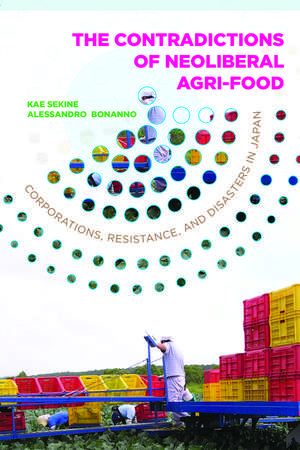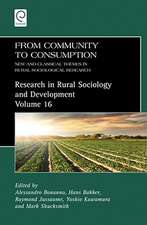The Contradictions of Neoliberal Agri-Food: Corporations, Resistance, and Disasters in Japan: Rural Studies
Autor Kae Sekine, Alessandro Bonannoen Limba Engleză Paperback – aug 2016
Employing original fieldwork, historical analysis, and sociological theory, Sekine and Bonanno probe how Japan’s food and agriculture sectors have been shaped by the global push toward privatization and corporate power, known in the social science literature as neoliberalism. They also examine related changes that have occurred after the triple disaster of March 2011 (the earthquake, tsunami, and meltdown of the Fukushima Daiichi nuclear reactor), noting that reconstruction policy has favored deregulation and the reduction of social welfare.
Sekine and Bonanno stress the incompatibility of the requirements of neoliberalism with the structural and cultural conditions of Japanese agri-food. Local farmers’ and fishermen’s emphasis on community collective management of natural resources, they argue, clashes with neoliberalism’s focus on individualism and competitiveness. The authors conclude by pointing out the resulting fundamental contradiction: The lack of recognition of this incompatibility allows the continuous implementation of market solutions to problems that originate in these very market mechanisms.
Sekine and Bonanno stress the incompatibility of the requirements of neoliberalism with the structural and cultural conditions of Japanese agri-food. Local farmers’ and fishermen’s emphasis on community collective management of natural resources, they argue, clashes with neoliberalism’s focus on individualism and competitiveness. The authors conclude by pointing out the resulting fundamental contradiction: The lack of recognition of this incompatibility allows the continuous implementation of market solutions to problems that originate in these very market mechanisms.
Din seria Rural Studies
-
 Preț: 310.02 lei
Preț: 310.02 lei -
 Preț: 197.41 lei
Preț: 197.41 lei -
 Preț: 328.72 lei
Preț: 328.72 lei -
 Preț: 278.33 lei
Preț: 278.33 lei -
 Preț: 336.72 lei
Preț: 336.72 lei -
 Preț: 246.29 lei
Preț: 246.29 lei -
 Preț: 283.16 lei
Preț: 283.16 lei -
 Preț: 246.46 lei
Preț: 246.46 lei -
 Preț: 250.92 lei
Preț: 250.92 lei -
 Preț: 244.55 lei
Preț: 244.55 lei -
 Preț: 249.17 lei
Preț: 249.17 lei -
 Preț: 244.55 lei
Preț: 244.55 lei -
 Preț: 283.48 lei
Preț: 283.48 lei -
 Preț: 235.71 lei
Preț: 235.71 lei -
 Preț: 201.33 lei
Preț: 201.33 lei -
 Preț: 272.92 lei
Preț: 272.92 lei - 23%
 Preț: 467.68 lei
Preț: 467.68 lei
Preț: 194.53 lei
Nou
Puncte Express: 292
Preț estimativ în valută:
37.23€ • 38.63$ • 31.12£
37.23€ • 38.63$ • 31.12£
Carte disponibilă
Livrare economică 25 februarie-11 martie
Preluare comenzi: 021 569.72.76
Specificații
ISBN-13: 9781943665198
ISBN-10: 1943665192
Pagini: 248
Ilustrații: 12
Dimensiuni: 152 x 229 x 15 mm
Greutate: 0.34 kg
Ediția:1st Edition
Editura: West Virginia University Press
Colecția West Virginia University Press
Seria Rural Studies
ISBN-10: 1943665192
Pagini: 248
Ilustrații: 12
Dimensiuni: 152 x 229 x 15 mm
Greutate: 0.34 kg
Ediția:1st Edition
Editura: West Virginia University Press
Colecția West Virginia University Press
Seria Rural Studies
Recenzii
"At a time when there is much over-generalization about neoliberalism and its global impacts, this provocative and revealing book provides a detailed case study of Japan, presenting a clear picture of how neoliberal settings—in supporting a corporate agri-food agenda—have worked against small farmers and fisher-folk. It is a fascinating, illuminating, and, ultimately, sobering analysis."
Geoffrey Lawrence, University of Queensland
Geoffrey Lawrence, University of Queensland
"A novel and incisive analysis of the corporatization of Japanese agriculture and its acceleration after the triple disaster of March 2011. Groundbreaking."
Shuzo Teruoka, author of Agriculture in the Modernization of Japan, 1850–2000
Shuzo Teruoka, author of Agriculture in the Modernization of Japan, 1850–2000
Notă biografică
Kae Sekine is associate professor of economics at Aichi Gakuin University, Nagoya, Japan.
Alessandro Bonanno is Texas State University System Regents’ Professor and Distinguished Professor of Sociology at Sam Houston State University.
Alessandro Bonanno is Texas State University System Regents’ Professor and Distinguished Professor of Sociology at Sam Houston State University.
Textul de pe ultima copertă
Employing original fieldwork, historical analysis, and sociological theory, Sekine and Bonanno probe how Japan’s food and agriculture sectors have been shaped by the global push toward privatization and corporate power, known in the social science literature as neoliberalism. They also examine related changes that have occurred after the triple disaster of March 2011 (the earthquake, tsunami, and meltdown of the Fukushima Daiichi nuclear reactor), noting that reconstruction policy has favored deregulation and the reduction of social welfare.
Sekine and Bonanno stress the incompatibility of the requirements of neoliberalism with the structural and cultural conditions of Japanese agri-food. Local farmers’ and fishermen’s emphasis on community collective management of natural resources, they argue, clashes with neoliberalism’s focus on individualism and competitiveness. The authors conclude by pointing out the resulting fundamental contradiction: The lack of recognition of this incompatibility allows the continuous implementation of market solutions to problems that originate in these very market mechanisms.
Sekine and Bonanno stress the incompatibility of the requirements of neoliberalism with the structural and cultural conditions of Japanese agri-food. Local farmers’ and fishermen’s emphasis on community collective management of natural resources, they argue, clashes with neoliberalism’s focus on individualism and competitiveness. The authors conclude by pointing out the resulting fundamental contradiction: The lack of recognition of this incompatibility allows the continuous implementation of market solutions to problems that originate in these very market mechanisms.












